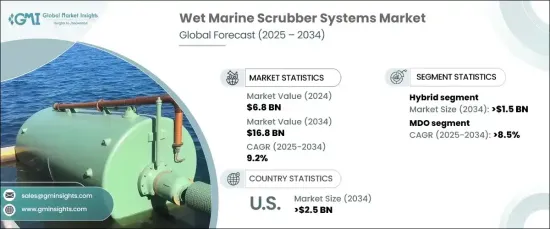
습식 선박 스크러버 시스템 세계 시장은 2024년 68억 달러로 평가되며 2025년부터 2034년까지 연평균 9.2%의 견고한 성장세를 보일 것으로 예상됩니다.
이러한 시스템은 화학 처리, 발전, 금속 제련, 폐기물 소각과 같은 산업에 필수적이며, 산업 배기가스 및 배연에서 오염 물질을 효율적으로 제거합니다. 특히 개발도상국의 산업화가 가속화됨에 따라 효과적인 오염 방지 시스템에 대한 수요는 지속적으로 증가하고 있습니다. 습식 선박용 스크러버는 지속가능성과 대기질 개선에 대한 전 세계적인 관심에 부응하는 동시에 강화되는 환경 규제를 충족하는 데 중요한 솔루션을 제공합니다.

특히 해운 부문의 엄격한 환경 규제는 시장 수요를 촉진하는 중요한 촉매제입니다. 배출 규제 구역 설정 및 황 상한선 시행으로 인해 선박 운영업체는 이러한 기준을 준수해야 합니다. 습식 선박 스크러버 시스템은 이러한 규제 요건을 충족시킬 뿐만 아니라 입자상 물질, 산성 가스 및 기타 유해한 배출물을 감소시켜 대기 질을 크게 개선합니다. 이러한 환경 규정 준수와 운영 효율성이라는 두 가지 장점으로 인해 다양한 산업 및 해양 응용 분야에서 투자를 유치하고 있습니다.
| 시장 범위 | |
|---|---|
| 시작 연도 | 2024년 |
| 예측 연도 | 2025-2034년 |
| 시작 금액 | 68억 달러 |
| 예상 금액 | 168억 달러 |
| CAGR | 9.2% |
시장은 시스템 유형에 따라 오픈 루프, 폐쇄 루프, 하이브리드, 기타로 구분되며, 하이브리드 시스템이 큰 견인력을 가지고 있으며, 2034년까지 하이브리드 부문은 15억 달러의 시장을 창출할 것으로 예상됩니다. 하이브리드 스크러버는 개방형 루프와 폐쇄형 루프 모드를 전환할 수 있는 유연성을 제공하며, 적응성과 비용 효율성으로 인해 점점 더 선호되고 있습니다. 또한, 스크러버 기술의 발전으로 이러한 시스템은 더욱 효율적이고 사용하기 쉬워져 보급을 더욱 촉진하고 있습니다. 대기 오염 감소와 세계 배출 기준 준수에 대한 관심이 높아짐에 따라 이러한 다목적 시스템에 대한 안정적인 수요가 보장됩니다.
연료 유형별로는 선박용 디젤유(MDO), 선박용 가스유(MGO), 하이브리드, 기타 등이 있으며, MDO 분야는 선박용 연료의 황 함유량을 0.5%로 제한하는 세계 황 함유량 규제에 힘입어 2034년까지 연평균 8.5%의 성장률을 보일 것으로 예상됩니다. 이러한 규제와 배출 규제 지역의 확대와 함께 선박 운영사들은 비용 효율성을 유지하면서 규제 준수를 달성하기 위해 스크러버를 채택할 수밖에 없는 상황입니다.
미국 시장은 경제 성장, 선박 개조 및 청정 기술을 장려하는 정부의 엄격한 정책에 힘입어 2034년까지 25억 달러에 달할 것으로 예상됩니다. 스크러버의 재료, 설계 및 제어 시스템의 혁신은 성능과 지속가능성을 향상시키고 친환경 산업 관행으로 전환하는 데 있어 중요한 솔루션으로서의 역할을 강화하고 있습니다. 규제 압력, 기술 발전, 대기 질 개선에 대한 인식이 높아짐에 따라 습식 선박 스크러버 시스템 시장은 세계 청정 산업을 추진하는 데 있어 매우 중요한 역할을 할 것으로 예상됩니다.
The Global Wet Marine Scrubber Systems Market, valued at USD 6.8 billion in 2024, is expected to expand at a robust CAGR of 9.2% between 2025 and 2034. These systems are indispensable for industries such as chemical processing, power generation, metal refining, and waste incineration, efficiently removing pollutants from industrial exhaust and flue gases. As global industrialization accelerates, particularly in developing regions, the demand for effective pollution control systems continues to rise. Wet marine scrubbers offer a critical solution to meet tightening environmental regulations while addressing the growing global focus on sustainability and air quality improvement.

Strict environmental mandates, especially in the maritime sector, are a key catalyst driving market demand. The establishment of emission control zones and enforcement of sulfur caps have made compliance with these standards imperative for vessel operators. Wet marine scrubber systems not only help industries meet these regulatory requirements but also significantly enhance air quality by reducing particulate matter, acid gases, and other harmful emissions. This dual benefit of environmental compliance and operational efficiency is attracting investments across various industrial and maritime applications.
| Market Scope | |
|---|---|
| Start Year | 2024 |
| Forecast Year | 2025-2034 |
| Start Value | $6.8 Billion |
| Forecast Value | $16.8 Billion |
| CAGR | 9.2% |
The market is segmented by system type into open-loop, closed-loop, hybrid, and others, with hybrid systems gaining considerable traction. By 2034, the hybrid segment is projected to generate USD 1.5 billion. Hybrid scrubbers, offering the flexibility to switch between open and closed-loop modes, are increasingly favored for their adaptability and cost-effectiveness. Advancements in scrubber technology are also making these systems more efficient and accessible, further driving their adoption. The growing emphasis on reducing air pollution and achieving compliance with global emission standards ensures a steady demand for these versatile systems.
By fuel type, the market includes marine diesel oil (MDO), marine gas oil (MGO), hybrid, and others. The MDO segment is expected to grow at a CAGR of 8.5% through 2034, driven by the global sulfur cap, which limits sulfur content in marine fuels to 0.5%. These regulations, coupled with the expansion of emission control areas, are compelling vessel operators to adopt scrubbers to achieve compliance while maintaining cost efficiency.
The United States market is forecasted to reach USD 2.5 billion by 2034, fueled by economic growth, the retrofitting of vessels, and stringent government policies that encourage cleaner technologies. Innovations in scrubber materials, design, and control systems are enhancing their performance and sustainability, reinforcing their role as a vital solution in the transition to environmentally friendly industrial practices. The combination of regulatory pressures, technological advancements, and increasing awareness of air quality benefits positions the wet marine scrubber systems market as a pivotal player in the global push for cleaner industries.